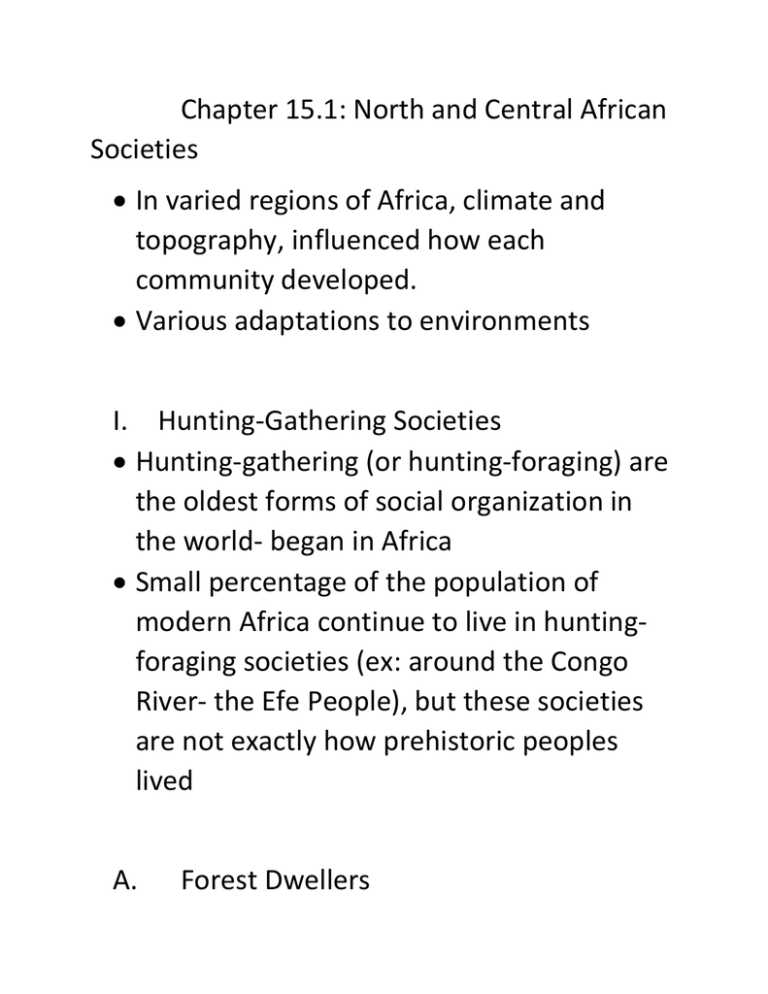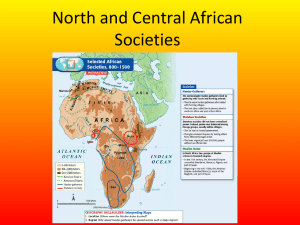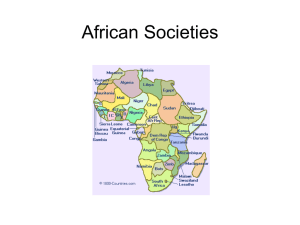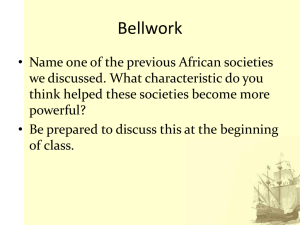Chapter 15.1: North and Central African Societies
advertisement

Chapter 15.1: North and Central African Societies In varied regions of Africa, climate and topography, influenced how each community developed. Various adaptations to environments I. Hunting-Gathering Societies Hunting-gathering (or hunting-foraging) are the oldest forms of social organization in the world- began in Africa Small percentage of the population of modern Africa continue to live in huntingforaging societies (ex: around the Congo River- the Efe People), but these societies are not exactly how prehistoric peoples lived A. Forest Dwellers Efe are one of several hunting-gathering societies in Africa- live in Ituri Forest in the Democratic Republic of the Congo (formerly Zaire) Efe live in small groups of no more than 50 members…all related Each family has own grass-and-brush shelter within a camp…but homes are rarely permanent Efe collect few possessions and move to new camps as they use up the resources in the surrounding area Efe society- women are the gatherers and Efe men and older boys are the hunters o Use poison-tipped arrows Efe add to their diet by trading honey, wild game, and other forest products for crops grown by farmers in nearby villages B. Social Structure Respected older male, such as a father, uncle, or father-in-law, typically serves as group leader Each family within the band makes its own decisions and is free to come and go Arguments are settled with long discussions…or if cannot be rectified, a group member may move to another band Ethical code that determines how members share food and possessions II. Stateless Societies Family organization is central to African society Families are organized into groups called lineages o Members of lineage claim a common ancestor o Lineage includes living members, past members, and future generations o “World of the living, world of the dead, world of those yet to be born…” Some societies where lineage groups take the place of rulers…called stateless societies o Without centralized system of power o Authority balanced among lineages of equal power o Usually stateless societies worked through differences to cooperate and share power Igbo (or Ibo) people of southern Nigerialived in stateless society o When disputes arose, respected elders from different lineages settled the problem (ex: Things Fall Apart egwugwu) o Igbo later encountered challenges from European colonizers who expected one single leader to rule over the whole society A. Tracing Family Descent Way a society traces lineage decides the inheritance rights and what groups individuals belong to Patrilineal society- trace ancestors through father…inheritance passes from father to son…when son marries, he, his wife, and their children remain part of his father’s extended family Matrilineal society- children trace their ancestors through their mothers. Young men from a matrilineal culture inherit land and wealth from their mother’s family…even though inheritance rights are based through descent from women, men usually hold the positions of authority “Mother-land” “Father-land” B. Age-Set System Age set consists of young people within a region who are born during a certain time period Each age get passes together through clearly identified life stages, such as warrior or elder Ceremonies mark the passage to each new stage Men and women have different life stages Community building projects, herding cattle, assisting in raising of children Age-set system meant to teach discipline, community service, and leadership skills to their young III. Muslim States Many stateless societies developed south of the Sahara Islam played a vital role in political history of North Africa After Muhammad’s death in 632, Muslims swept across the northwest part of the continent o Muslims converted by conquest, and peaceful means By 670- Muslims ruled Egypt- joined Morocco, Tunisia, and Algeria as the Maghrib As Islam spread, some African rulers converted to Islam o Eventually basing governments upon Islamic law o Religious scholars were often government advisers A. Islamic Law In Islam, following the law is a religious obligation Muslims do not separate their personal life from religious life, and Islamic law regulates almost all areas of human life o Islamic law helped to bring order to Muslim states Provided the state with a set of values that shaped a common identity Law also helped to unify the Muslim world…North Africa is still politically and socially influenced by Islamic law today Berbers- desert dwellers who converted to Islam…nomads, some were Christians and Jews until expansion of Muslim Arabs in the 600’s Two Berber groups, Almoravids and Almohads, founded empires that united the Maghrib under Muslim rule A. Almoravid Reformers 11th century- Muslim reformers founded the Almoravid Dynasty o Members were Berbers originally from Mauritania in western Sahara o Movement began after a devout Berber Muslim made a hajj to Mecca Brought a Muslim scholar from Morocco, named Abd Allah Ibn Yasin, back home to teach about Islam Ibn Yasin gained followers with his strict interpretation of Islam, known as the Almoravids 1050’s, Ibn Yasin led the Almoravids in an effort to spread Islam through conquest o Ibn Yasin died in battle, but Almoravids took Morocco and founded Marrakech…used as capital Almoravids then overran the West African empire of Ghana by 1076, and captured parts of southern Spain (called Moors there) B. Almohads Take Over Mid-1100’s: Almohads- another group of Berber Muslim reformers took power from the Almoravids Almohads began as a militant religious movement in the Atlas Mountains of Morocco Almohads followed teachings of Ibn Tumart…after making a pilgrimage to Mecca, Ibn Tumart denounced the later Almoravid rulers for moving away from the traditional practice of Islam o Urged his followers to strictly obey the teachings of the Qu’ran and Islamic law Almohads, led by Abd al-Mumin, fought to oust the Almoravids and remain true to traditional Islamic beliefs 1148-Almohads controlled most of Morocco and ended Almoravid rule o Kept Marrakech as their capital o By end of 12th century, had conquered much of southern Spain o Empire stretched from Marrakech to Tripoli and Tunis on the Mediterranean o Almohid Dynasty gradually declined and broke into individual Muslim dynasties Societies in West Africa were emergingboasting tremendous economic and political power and strong links to international trade routes.





